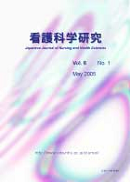Volume 21
Displaying 1-13 of 13 articles from this issue
- |<
- <
- 1
- >
- >|
Original Article
-
Article type: Original Article
2023Volume 21 Pages 1-9
Published: 2023
Released on J-STAGE: March 22, 2023
Download PDF (584K)
Study Paper
-
Article type: Study Paper
2023Volume 21 Pages 10-17
Published: 2023
Released on J-STAGE: March 22, 2023
Download PDF (569K)
Original Article
-
The effect of comfortable brassieres on breast tenderness in lactating women with breast engorgementArticle type: Original Article
2023Volume 21 Pages 18-28
Published: 2023
Released on J-STAGE: May 24, 2023
Download PDF (903K)
Review Article
-
Article type: Original Article
2023Volume 21 Pages 29-40
Published: 2023
Released on J-STAGE: May 24, 2023
Download PDF (881K)
Original Article
-
Article type: Original Article
2023Volume 21 Pages 41-49
Published: 2023
Released on J-STAGE: May 24, 2023
Download PDF (640K)
Clinical Data
-
Article type: Clinical Data
2023Volume 21 Pages 50-57
Published: 2023
Released on J-STAGE: May 24, 2023
Download PDF (651K)
Study Paper
-
2023Volume 21 Pages 58-67
Published: 2023
Released on J-STAGE: July 04, 2023
Download PDF (743K)
Clinical Data
-
2023Volume 21 Pages 68-81
Published: 2023
Released on J-STAGE: July 04, 2023
Download PDF (930K)
Study Paper
-
Article type: Study Paper
2023Volume 21 Pages 82-90
Published: 2023
Released on J-STAGE: August 01, 2023
Download PDF (593K)
Erratum
-
2023Volume 21 Pages 91
Published: 2023
Released on J-STAGE: August 11, 2023
Download PDF (57K)
Review Article
-
Article type: Review Article
2023Volume 21 Pages 92-107
Published: 2023
Released on J-STAGE: December 14, 2023
Download PDF (2500K)
Study Paper
-
Article type: Study Paper
2023Volume 21 Pages 108-118
Published: 2023
Released on J-STAGE: December 14, 2023
Download PDF (1290K)
Clinical Data
-
Article type: Clinical Cate
2023Volume 21 Pages 119-126
Published: 2023
Released on J-STAGE: December 14, 2023
Download PDF (719K)
- |<
- <
- 1
- >
- >|
